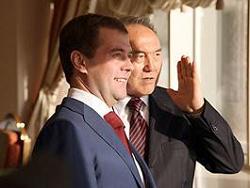
Russia and Kazakhstan Pursue Energy Partnership
Publication: Eurasia Daily Monitor Volume: 6 Issue: 177
By:

Russia and Kazakhstan’s leadership have reiterated pledges to boost their bilateral economic and energy partnership. However, they remain divided over some divergent interests, notably in gas processing and oil transit. Earlier this month, Russian President Dmitry Medvedev and his Kazakh counterpart Nursultan Nazarbayev met at a conference on regional economic cooperation. During this meeting in Orenburg on September 11, Medvedev and Nazarbayev agreed to develop their bilateral energy partnership. Medvedev announced that both sides aimed to create a joint company to develop civilian nuclear power projects (Interfax, ITAR-TASS, RIA-Novosti, September 11).
The bilateral summit on September 11 was followed by other high-level exchanges between Russia and Kazakhstan. On September 17, Yuri Luzhkov the Mayor of Moscow traveled to Aktau, on Kazakhstan’s Caspian coast, and hailed bilateral economic ties. He argued that Kazakh producers proved to be reliable suppliers of grain and other food produce to the Russian capital (Interfax, September 17). Furthermore, in an apparent demonstration of closer bilateral ties the Russian and Kazakh leaders have remained in regular contact. On September 18, Medvedev and Nazarbayev held telephone talks to discuss bilateral cooperation and international security. Nazarbayev reportedly hailed President Barack Obama’s decision on ballistic missile defense and Medvedev’s commitment to continue his dialogue with the U.S. (Interfax, RIA-Novosti, September 18).
During the Orenburg summit, both sides signed agreements on energy, including a project to upgrade the Ekibastuz power plant, and further enhance their military cooperation. Medvedev suggested integrating the power supply systems of both countries, while Nazarbayev promised to increase electricity supplies from Kazakhstan to the Siberian regions in Russia (Interfax, ITAR-TASS, RIA-Novosti, September 11). On September 18, Nazarbayev repeated earlier promises to supply 500 megawatts (mw) of electricity from the Ekibastuz power plant to Russia in order to help tackle power shortages in Siberia in the wake of the Sayano-Shushenskaya hydropower plant disaster (Interfax, September 17).
In Orenburg, Medvedev praised existing joint ventures, including the Orenburg gas processing plant. On September 10, Orenburg governor Alexey Chernyshev announced that the Orenburg gas processing plant was expected to process 17.6 billion cubic meters (bcm) annually of Kazakh gas by 2012. The project is expect to require 18 billion rubles ($590 million) in joint investment, he said (Interfax, September 10-11). Moreover, on September 11 Kazakhstan’s Energy and Mineral Resources Minister Sauat Mynbayev announced that Gazprom’s joint venture with Kazakhstan’s state oil and gas company KazMunaiGas to process gas at the Orenburg gas plant could be further delayed because the development of the Karachaganak gas field has taken longer than expected. Mynbayev added that Karachaganak’s future would be clarified by the end of 2009. The total investment in the modernization of the Orenburg plant and the construction of a gas pipeline from Kazakhstan was estimated at $300-320 million, while the cost of Kazakhstan’s alternative project to build its own gas processing plant at Karachaganak was estimated at $1.3 billion (Interfax, September 11).
In March 2005, Gazprom first indicated its plan to set up a joint venture with KazMunaiGas to process at the Orenburg gas plant the natural gas from the Karachaganak field, near the Russian border in northwestern Kazakhstan. In May 2006, Gazprom said the joint venture would process up to 15 bcm per year from Karachaganak at its Orenburg plant. In December 2007, KazMunaiGaz announced that it expected the creation of the Orenburg joint venture in mid-2008. Yet, more than four years after the original announcement, the final joint venture deal still appeared to remain elusive, as the parties involved apparently struggled to agree on the venture’s financial terms.
During the summit meeting in Orenburg on September 11, Medvedev also urged stronger bilateral cooperation on the Caspian Pipeline Consortium (CPC) (Interfax, September 11). However, in recent years both sides have struggled to agree on the issues connected with the Baku-Novorossiysk pipeline owned by the CPC. The CPC has operated at relatively low rates, partly due to Kazakhstan’s reluctance to commit more crude to the pipeline. The CPC, in which Russia owns a 24 percent stake, has reportedly gained close to nothing for Moscow. Russian officials have long complained that the CPC was making losses, and the consortium’s debt has remained at some $5 billion.
In April 2006, then President Vladimir Putin and Nazarbayev announced a major agreement on the Caspian crude transit from Kazakh oil fields through Russia to Europe. Russia and Kazakhstan agreed to more than double crude oil deliveries via the CPC from 28 million tons a year in 2005. In May 2008, Russia and Kazakhstan confirmed the agreement on increasing the capacity of the CPC from 32 million tons per year up to 50 million tons annually at the first stage of the expansion project and up to 67 million tons by 2012.
Moscow has been eager to maintain its influence over energy transit routes in the Caspian region. Russian officials pressed Nazarbayev to agree to a 15-year deal under which Kazakhstan would commit to exporting more crude oil via Russian pipelines. However, a binding oil transit deal between Russia and Kazakhstan has proven elusive. Therefore, during their summit in Orenburg the Russian and Kazakh leaders faced the challenging task of discussing some divisive issues. Despite the officially optimistic pronouncements, bilateral gas processing and oil transit deals still appear to remain some way off.




